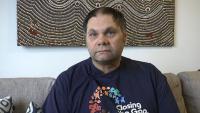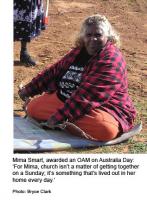Remote Aboriginal communities in the state of South Australia are holding an emergency summit this weekend in a bid to stop funding cuts that could force the closure of communities, in a move labelled "cultural genocide". Representatives from every regional and remote community in the farflung state have united to call for long term bilateral agreement between federal and state governments. Crisis meetings were held in the state over last weekend, and the leaders demand an urgent meeting with the state government.
The West Australian state government has suggested closing some communities as a result of federal government funding cuts. The South Australian government says it's pushing the Commonwealth to change its decision, but Indigenous groups say the lack of a plan B is causing anxiety.
The South Australian indigenous leaders have condemned the plans to close the remote settlements as “cultural genocide”. The presiding member of South Australia Aboriginal Lands Trust, Haydyn Bromley, describes it as a crisis.
It was a rare show of solidarity as elders feared some outback towns would be closed. Elder Mima Smart worried that people will be forced to move from their homelands. She said, if that happened, there would be nowhere appropriate for Indigenous people to connect with their beliefs. "I want the people, the community people, to stay in the country," she said. "There will be no place for us to practice our culture." Ms Smart was awarded the Order of Australia medal in 2012 "For service to the Indigenous community in South Australia".
Community closures have already begun in Western Australia and South Australian communities fear they'll be next.
"We're meeting for a day and a half to discuss the crisis that we have. It's not even an impending crisis," said Mr Bromley. "It is a crisis. We know that in a little over three months' time, people are going to lose jobs. Aboriginal people who are employed are going to lose jobs and communities are going to shrink."
Mr Bromley says the commonwealth's suggestion that essential services can be maintained by accessing alternative funding sources, such as Indigenous Advancement Strategy grants, is no solution.
"They've said well you can apply for IAS funding, which is indigenous funding, to cover the gap - communities went out and applied for funding, including ALT (Aboriginal Lands Trust) as the umbrella organisation - no communities in South Australia were funded."
Of the state's 30,000 Aboriginal citizens, about 10,000 live outside urban areas.
Without money for services such as water, sewerage, rubbish collection and electricity Mr Bromley fears people will be forced from their homes.
"Well you think about it - you've got a whole lot of people who are living on communities; all of a sudden they're lobbing on townships and wanting housing, they're wanting services. So we're going to end up with a new generation of displaced people, displaced Aboriginal South Australians and this will be a new generation of cultural genocide."



See also
Top of Form
Aboriginal Australian communities send a powerful message to government
In defence of our land and our freedoms
Maori solidarity with the Nyoongar people at Matargarup, Perth
"Shameless, insensitive, outrageous, incredibly racist, lacking humanity, disconnected from reality"
Aboriginal Australian communities announce a global call to action
Support for remote Aboriginal communities in Australia
Maori politicians support Aboriginal protest over proposed closure of indigenous communities
Aboriginal group fights to stop $16bn Carmichael coalmine, Australia’s largest
Aboriginal protesters come face-to-face with politicians during Canberra 'sit-in'
Western Australiens Nyungahr People rufen nach deutscher Unterstuetzung